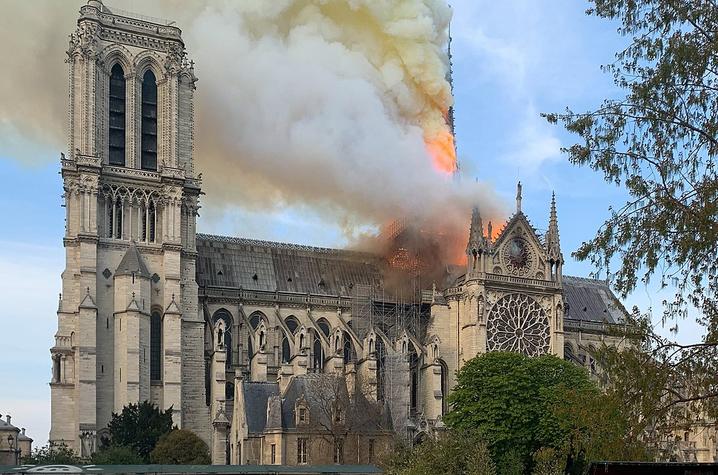UK Taking Lead Role in Crisis Planning in Arts Administration

LEXINGTON, Ky. (Dec. 19, 2019) — A packed meeting room of students, faculty, staff and arts professionals in the University of Kentucky’s Gatton Student Center earlier this month for a discussion titled “Imagining the Worst Case Scenario ... Then Doing Something About It” pointed to what many already fear — it is not if a crisis will happen at their workplace, but when.
Whether it is a natural — like wildfire or flooding — or a human-created disaster, arts venues are unfortunately not immune to tragedy. The costs in lives, resources and assets, as well as a shift in liability are forcing artists and arts leaders to think about how they can successfully manage a crisis.
With the number of incidents on the rise, UK Department of Arts Administration has taken a leadership role in preparing current and future generations of arts professionals to better manage crises that may impact their patrons, employees, programming and/or facility.
As part of their academic approach to this arts industry need, the department is offering courses for their traditional students and professional development opportunities for alumni and other arts leaders. Leading the initiative for UK is part-time instructor Leah Hamilton, one of the nation's first arts administration academics to take on this topic.
An arts executive, educator and professional musician with experience in strategic planning, fund development, legislative advocacy, facility management and cultural policy, Hamilton currently works as an independent arts consultant and researcher. She previously served as instructor and director of Arts Administration at Drury University in Springfield, Missouri.
Hamilton gained in-field cultural management experience as the executive director of the leading arts agency in Southwest Missouri, the Springfield Regional Arts Council. Under her leadership, the council stabilized its funding and expanded its programming and facilities at The Creamery Arts Center.
Hamilton’s interest in emergency management began with her master’s thesis at Drexel University, "Arts Facility Emergency Preparedness in the State of Missouri," which was awarded the Top Thesis Award and Academic Excellence Award by the university in 2016. Her research, curriculum and management models for emergency planning in arts facilities have since been presented at the International Conference on Social Theory, Politics, and the Arts; the Congress for European Network for Cultural Policy and Management; and the annual Arts Administration Educators Association conference.
AAD 585: Emergency Preparedness in the Arts gives UK arts administration students a sociological overview of community and individual actions and reactions to disasters and how these actions relate to artistic environments. Students learn how to build a disaster plan by creating an organizational commitment to safety through policy and organizational design, building crisis communication strategies, and identifying modern threats through risk assessments and training
Hamilton’s professional development course at UK offers arts professionals already working in the field a similar understanding of community actions and reactions to crises as well as direction in developing a customized disaster plan for their arts and cultural organization via an online eight-week course. The Department of Arts Administration started offering this continuing education programming last summer and will present its next session this winter beginning Jan. 6.
Arts professionals are already giving the program a thumbs up. "Taking the online Arts Emergency Management course was exactly what my growing organization needed to take us to the next level,” said Vanessa Kaeton Crosby, of the Leeds Center for the Arts in Winchester, Kentucky. “As an assistant executive director, I found that the course material heightened my awareness and guided me into a more secure, efficient, and planned place of leadership. Talking with our board of directors, creative team, and volunteers about what I learned from the course invited a sense of security and understanding among us all to ensure the safety of our beloved patrons, as well as how to better preserve our historic space."
President and CEO of LexArts Nan Plummer agreed. “The course has been just the impetus I needed to get started on a long-needed emergency preparedness plan. It has also guided my thinking through some stubborn dilemmas. The course resources and Professor Hamilton’s feedback have helped our plan both embody best practices and fit the creative culture, limited finances, and unique challenges of our small arts organization.”
Founded in 1987, the Department of Arts Administration at UK College of Fine Arts offers one of the most comprehensive curricula in the country. Dynamic and innovative, the department leads national and international initiatives in teaching, research, professional and community service to educate and inspire responsible arts leaders, artists and entrepreneurs.
As the state’s flagship, land-grant institution, the University of Kentucky exists to advance the Commonwealth. We do that by preparing the next generation of leaders — placing students at the heart of everything we do — and transforming the lives of Kentuckians through education, research and creative work, service and health care. We pride ourselves on being a catalyst for breakthroughs and a force for healing, a place where ingenuity unfolds. It's all made possible by our people — visionaries, disruptors and pioneers — who make up 200 academic programs, a $476.5 million research and development enterprise and a world-class medical center, all on one campus.




